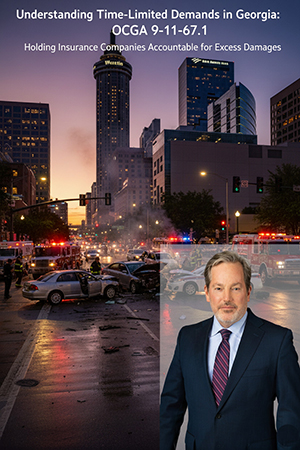Call Now For A Case Evaluation
Call Now For A Case Evaluation
 As an experienced Atlanta personal injury lawyer, I’ve represented countless clients who’ve been injured in car accidents, slip-and-falls, and other incidents caused by someone else’s negligence. One of the most powerful tools in our arsenal for ensuring fair compensation is the time-limited demand under Georgia law, specifically OCGA § 9-11-67.1. This statute provides a structured way for injury victims to make settlement offers to insurance companies before filing a lawsuit, and it can have serious consequences for insurers who fail to act responsibly. In this post, I’ll break down what a 30-day time-limited demand is, how it works, and why it can lead to insurance companies being liable for damages beyond their policy limits if they don’t settle.
As an experienced Atlanta personal injury lawyer, I’ve represented countless clients who’ve been injured in car accidents, slip-and-falls, and other incidents caused by someone else’s negligence. One of the most powerful tools in our arsenal for ensuring fair compensation is the time-limited demand under Georgia law, specifically OCGA § 9-11-67.1. This statute provides a structured way for injury victims to make settlement offers to insurance companies before filing a lawsuit, and it can have serious consequences for insurers who fail to act responsibly. In this post, I’ll break down what a 30-day time-limited demand is, how it works, and why it can lead to insurance companies being liable for damages beyond their policy limits if they don’t settle.
Enacted in 2013 and amended several times—most recently in 2024—OCGA § 9-11-67.1 governs pre-suit settlement offers in cases involving personal injury, bodily injury, or death arising from motor vehicle collisions. This law applies specifically to tort claims prepared with the help of an attorney and sets strict requirements for how these offers must be made and responded to. Its goal is to encourage early, fair settlements while protecting both parties from unfair tactics.
Under the statute, a time-limited demand is essentially a formal offer from the injured party (or their attorney) to settle the claim for a specific amount, often within the at-fault driver’s insurance policy limits. The “time-limited” part means the offer expires after a set period, giving the insurance company a deadline to accept or reject it.
One common timeframe for these demands is 30 days, which is the minimum period allowed under the law for the recipient to respond. Here’s what makes a valid time-limited demand under OCGA § 9-11-67.1:
If the demand doesn’t meet these criteria, it may not be enforceable, which is why working with an experienced attorney like myself is crucial to get it right.
For injury victims, a time-limited demand puts pressure on the insurance company to evaluate the claim seriously and respond promptly. It often includes evidence like medical records, accident reports, and witness statements to demonstrate the strength of your case. If accepted, it can resolve the matter quickly without the need for a lengthy lawsuit, saving time, money, and stress.
But the real power comes when the insurance company ignores or rejects a reasonable demand.
Here’s where things get interesting—and potentially very costly for insurers. Under Georgia law, if an insurance company fails to settle a claim within policy limits when given a reasonable opportunity (like a valid time-limited demand), and the case later goes to trial resulting in a verdict exceeding those limits, the insurer can be held liable for the excess amount in a “bad faith” or “negligent failure to settle” claim.
This stems from landmark cases like Southern General Insurance Co. v. Holt (1992), which established that insurers have a duty to protect their policyholders from excess judgments by settling when it’s prudent to do so. If they act negligently, fraudulently, or in bad faith—such as by lowballing offers or delaying responses—they can face:
Importantly, the Georgia Supreme Court has clarified that there is no affirmative duty to settle without a valid within-limits demand first being made. That’s why crafting a proper time-limited demand under OCGA § 9-11-67.1 is key—it creates that opportunity and sets the stage for potential excess liability if ignored.
In my practice, I’ve seen insurers scramble when faced with these demands because they know the risks. For example, if your policy limit is 300,000, the insurer could be on the hook for the full amount if they blew their chance to settle.
Time-limited demands empower victims by forcing insurers to take your claim seriously early on. They can lead to faster payouts and hold companies accountable for unfair practices. However, the process is complex, with recent amendments changing how releases and payments are handled (e.g., allowing payments in installments under certain conditions).
If you’ve been injured in Atlanta or anywhere in Georgia, don’t navigate this alone. Insurance companies have teams of adjusters and lawyers working against you—level the field with experienced representation.
Contact me, George Creal, today for a free consultation. Let’s discuss your case and see if a time-limited demand is the right strategy to get you the compensation you deserve. Call 770-961-5511 or visit www.georgialawyer.com to get started.
Disclaimer: This post is for informational purposes only and does not constitute legal advice. Laws can change, and outcomes depend on specific facts. Consult an attorney for advice tailored to your situation.

George Creal is a trial lawyer who has been practicing law
in the Metro-Atlanta area for over 27 years. George brings
a broad range of experience to the courtroom. Read More